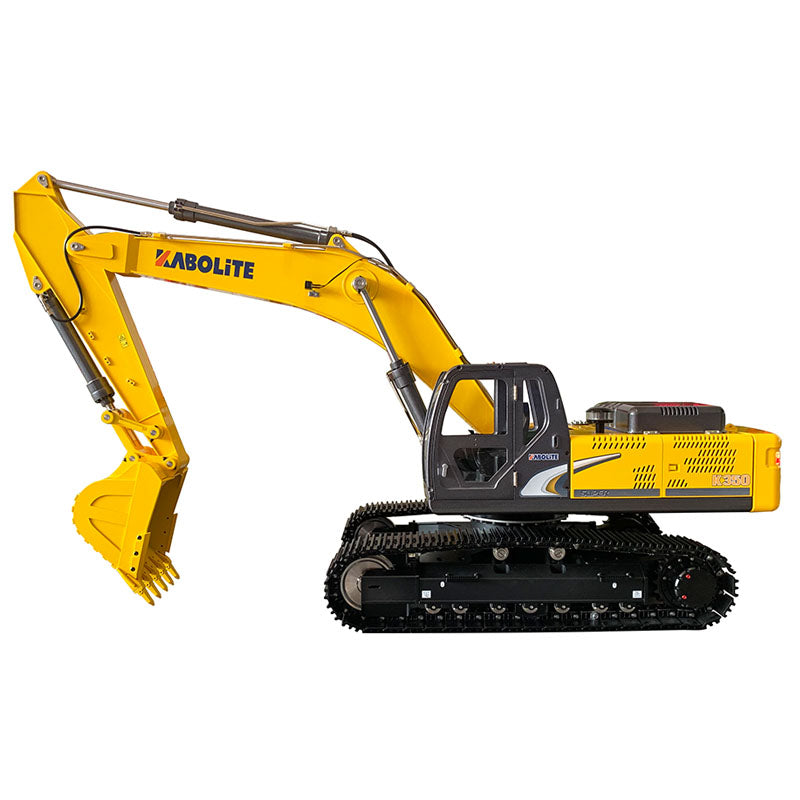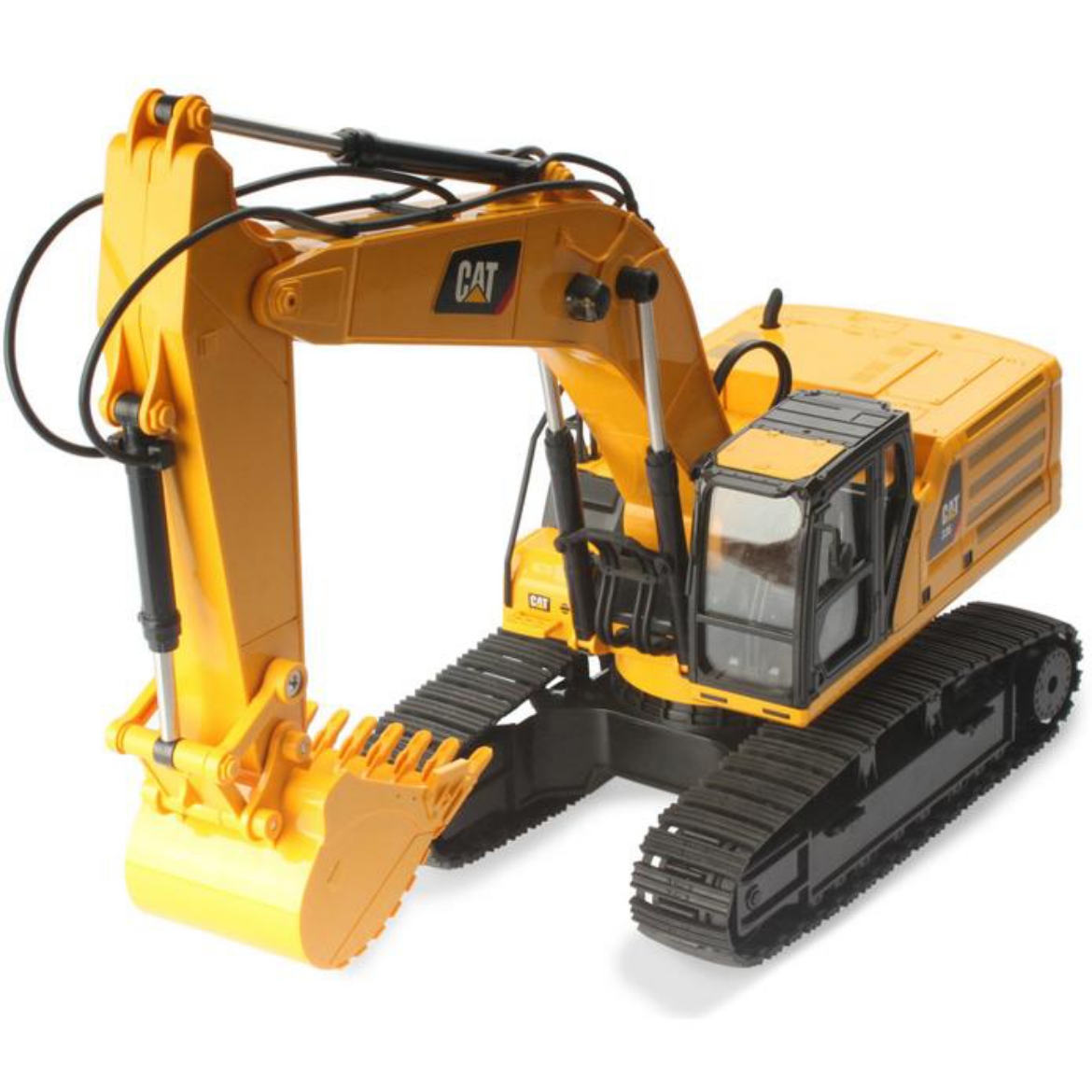The Best Benefits of Using a remote control excavator in Demolition Tasks
Wiki Article
Discover the Importance of Excavator in Modern Building Projects
Excavators are important devices in modern construction projects. Their versatility enables them to perform a large variety of jobs, from excavating and grading to demolition and website prep work. Advanced features, such as hydraulic add-ons and GPS, boost their abilities and efficiency on job websites. As the sector advances, the significance of excavators grows much more. Recognizing their duty can reveal insights into the future of building practices. What lies ahead for these equipments?The Versatility of Excavators in Different Projects
Although excavators are often connected with large construction projects, their adaptability enables them to be used in a variety of applications, from domestic landscaping to energy maintenance. In urban setups, excavators can navigate tight spaces to dig foundations for homes or install drainage systems. Their capability to do fragile jobs makes them perfect for landscape design tasks, where they can dig deep into for fish ponds or plant trees. Furthermore, excavators play a crucial duty in energy maintenance, successfully excavating trenches for pipelines or cables without interfering with bordering locations. In farming applications, they aid in land cleaning and soil prep work. Furthermore, their adaptability allows them to be geared up with numerous add-ons, improving their functionality throughout different jobs. This multifaceted nature of excavators not just streamlines different building processes yet additionally shows their important function in modern-day facilities growth and maintenance.Secret Features and Kinds Of Excavators
The conversation on key attributes and kinds of excavators highlights the vital attributes that make these devices vital in building and construction. Various excavator kinds, each developed for details tasks, demonstrate their convenience and efficiency across various applications. rc excavator. Understanding these classifications and features is vital for maximizing their usage in contemporary building projectsExcavator Keys In Review
Excavators play an essential duty in contemporary building, using versatility and effectiveness throughout numerous jobs. These hefty equipment units come in a number of kinds, each tailored for certain applications. The most usual kinds consist of spider excavators, recognized for their security on uneven terrain, and wheeled excavators, which offer higher flexibility on smooth surfaces. Miniature excavators are preferred for limited areas and small-scale jobs, while long-reach excavators are designed for deep excavating. Furthermore, there are specific excavators, such as hydraulic excavators, which improve power and accuracy. Each kind includes distinct capacities, making them necessary for jobs varying from excavating and grading to demolition and product handling. Understanding these variations allows building experts to select the ideal excavator for their job needs.Secret Includes Explained
Comprehending the key functions of excavators improves their effective application in construction projects. Excavators are identified by their effective hydraulic systems, which supply the required pressure for excavating, lifting, and moving materials. Their articulated arms permit a large range of movement, assisting in accurate procedures in restricted spaces. In addition, the range of attachments, such as pails, grapples, and augers, broadens their versatility to fulfill various job demands. The dimension and weight of excavators likewise add to their stability and ability to move on different surfaces. In addition, improvements in modern technology have resulted in the assimilation of general practitioner and automation, improving precision and performance in excavation jobs. These attributes jointly position excavators as indispensable devices in modern-day building.Applications in Building and construction
Changing construction sites, excavators play a pivotal function throughout numerous applications, ranging from property structure projects to massive facilities advancements. These versatile devices are furnished for tasks such as digging structures, trenching for energies, and website grading. Various kinds of excavators, including crawler, rolled, and mini excavators, offer particular advantages tailored to the project requirements. Crawler excavators master harsh surfaces, while rolled excavators offer flexibility on smooth surface areas. Mini excavators are suitable for restricted spaces, making them preferred in urban setups. The performance and power of excavators considerably quicken construction processes, guaranteeing timely job completion. Their versatility additionally boosts their relevance, allowing construction teams to tackle a diverse variety of obstacles successfully.Enhancing Performance and Productivity on Job Sites
Taking full advantage of effectiveness and efficiency on task websites is an essential purpose in modern-day building and construction. Excavators play a crucial duty in accomplishing this goal by improving different tasks. Their ability to do several features-- such as training, excavating, and grading-- decreases the need for added devices, thereby conserving time and resources.Moreover, excavators improve workflow by permitting for faster completion of projects. With advanced functions like hydraulic add-ons and general practitioners innovation, they can execute specific operations that decrease errors and revamp. This precision not just improves the top quality of work yet likewise enhances material usage, adding to set you back savings.The convenience of excavators enables them to adapt to different website conditions, making certain that jobs progress smoothly despite obstacles. By incorporating excavators into building and construction processes, groups can greatly boost their total efficiency, bring about prompt project completion and boosted productivity.Safety Benefits of Making Use Of Excavators
Excavators significantly improve safety on building sites with improved driver presence and minimized manual work threats. By supplying drivers with a clear sight of their environments, excavators help to stop injuries and accidents. In addition, the machinery minimizes the need for employees to take part in harmful manual tasks, even more advertising a much safer job environment.Improved Driver Presence
Construction websites can be chaotic and filled up with prospective hazards, boosted operator presence plays a vital role in making certain safety and security when making use of excavators. Modern excavators are designed with big, unblocked windows and tactically positioned mirrors, allowing drivers to keep a clear view of their surroundings (rc excavator). This improved visibility is crucial for detecting pedestrians, various other equipment, and different obstacles, significantly lowering the danger of accidents. In addition, lots of excavators incorporate sophisticated technology, such as sensors and cameras, to provide operators with extra point of views, further improving awareness. The capacity to see even more clearly not just aids in reliable operation yet also fosters a much safer workplace, making it easier for operators to navigate complex building and construction sites without jeopardizing security standardsLowered Manual Work Threats
When hands-on labor is minimized with making use of excavators, many security advantages emerge, substantially boosting the well-being of construction workers. Excavators reduce the physical strain related to heavy training and repetitive jobs, properly reducing the risk of bone and joint injuries. By automating procedures such as digging, grading, and relocating products, they allow employees to keep a more secure range from possible risks. Furthermore, excavators are furnished with sophisticated safety and security features, such as rollover security systems and enhanced operator ergonomics, which further safeguard employees on website. The result is a considerable decrease in work environment mishaps and injuries, bring about increased performance and morale among building and construction teams. Eventually, the adoption of excavators adds to a safer and much more reliable construction atmosphere.Excavators in Earthmoving and Site Prep Work
In modern construction, a considerable portion of earthmoving and website prep work jobs counts on the efficiency and adaptability of excavators. These machines are designed to take care of various soil types and surface, making them essential for rating, digging, and trenching tasks. Their hydraulic arms can be outfitted with various attachments, such as containers and augers, permitting operators to tailor their technique based upon specific task requirements.Excavators excel at moving huge volumes of earth swiftly and efficiently, which increases the overall building timeline. They can browse tight areas and testing sites where conventional equipment may have a hard time, enhancing performance. Furthermore, the accuracy of excavators guarantees that website preparation sticks to rigorous specifications, minimizing the threat of mistakes that could cause expensive rework.The Duty of Excavators in Demolition Tasks
Excavators play a vital function in demolition tasks, as they have the power and dexterity required to dismantle structures effectively. Equipped with various add-ons such as hydraulic breakers, shears, and grapples, these makers can adjust to various demolition needs, whether for little buildings or big commercial sites. Their adaptability allows drivers to tackle complex projects while maintaining safety and precision.In enhancement to their demolition capabilities, excavators promote debris elimination, ensuring that job websites continue to be organized and secure. By damaging down frameworks into convenient items, they enable for streamlined clearing up and recycling of products, aligning with modern-day sustainability efforts.Moreover, excavators can access limited rooms and browse unequal surface, making them essential in urban demolition jobs. Generally, their durable design and multifunctionality make excavators a critical property in the demolition phase of building and construction, adding significantly to job timelines and effectiveness.

Future Fads in Excavator Innovation and Usage
As the building industry evolves, developments in excavator modern technology are positioned to change their use and performance substantially. One significant pattern is the assimilation of automation and expert system, allowing excavators to operate with very little human intervention. This change will boost accuracy in jobs such as grading and trenching, reducing human error and boosting productivity.Additionally, the surge of electric and hybrid excavators is forming a more lasting building and construction setting, reducing carbon emissions and fuel prices. Enhanced telematics systems are also arising, allowing real-time tracking of maker performance and maintenance demands, which can lead to far better functional performance and longer tools lifespan.Moreover, innovations in attachment technology are broadening the flexibility of excavators, permitting them to execute a wider variety of jobs. The combination of these patterns shows a future where excavators are smarter, greener, and more versatile, ultimately reshaping construction project characteristics.
Frequently Asked Questions
Exactly How Do Excavators Contrast to Various Other Building Machinery?
Excavators, defined by their flexibility and power, master digging and earthmoving compared to other machinery. Their capacity to execute numerous tasks, consisting of training and demolition, makes them essential in building tasks, boosting total efficiency.
What Is the Average Life-span of an Excavator?
The average life-span of an excavator commonly ranges from remote control excavator 7,000 to 10,000 operating hours, relying on upkeep, use problems, and design. Correct care can expand this life-span, making certain peak efficiency throughout its operational years.How Are Excavators Maintained for Ideal Efficiency?
Excavators call for routine upkeep for peak performance, consisting of regular inspections, fluid checks, filter replacements, and prompt repairs. Carrying out a preventive upkeep routine aids prolong their life-span and guarantees efficient procedure in various building and construction atmospheres.What Are the Prices Associated With Getting an excavator vs. renting?
The costs related to leasing versus purchasing an excavator vary considerably. Leasing offers reduced upfront costs however can gather in time, while purchasing requires a significant first investment, yet supplies long-lasting financial savings and asset ownership advantages.What Training Is Called For to Operate an Excavator?
Operating an excavator calls for specialized training, generally including security protocols, device operation strategies, and environmental awareness. Accreditation programs often mandate functional experience, allowing drivers to handle numerous tasks successfully while making sure conformity with sector guidelines. The most usual types include crawler excavators, understood for their stability on irregular terrain, and wheeled excavators, which supply higher wheelchair on smooth surface areas. Small excavators are favored for small projects and tight areas, while long-reach excavators are created for deep excavating. Additionally, there are specific excavators, such as hydraulic excavators, which improve power and accuracy. Various kinds of excavators, including spider, wheeled, and mini excavators, provide details advantages tailored to the task demands. Crawler excavators succeed in rough surfaces, while wheeled excavators supply wheelchair on smooth surface areas.Report this wiki page